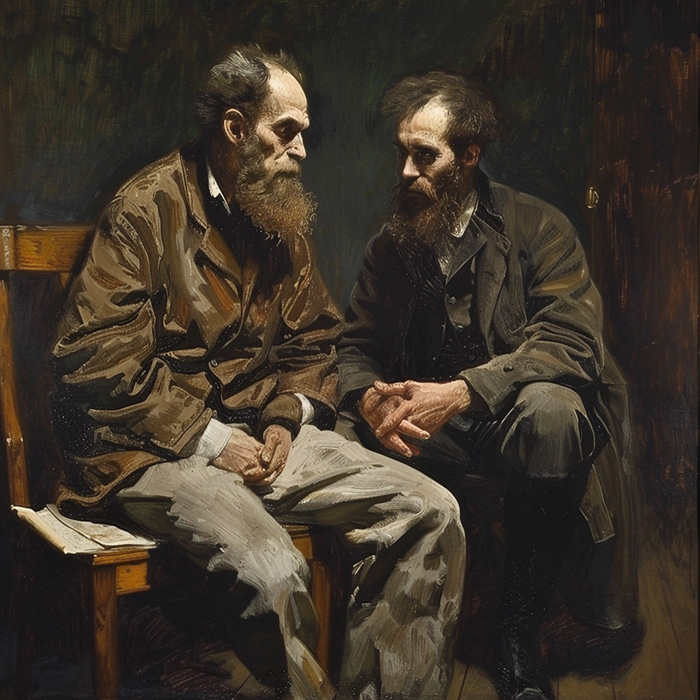
“Is there in the whole world a being who would have the right to forgive and could forgive? I don’t want harmony. From love for humanity I don’t want it. I would rather be left with the unavenged suffering. I would rather remain with my unavenged suffering and unsatisfied indignation, even if I were wrong. Besides, too high a price is asked for harmony; it’s beyond our means to pay so much to enter on it. And so I hasten to give back my entrance ticket, and if I am an honest man I am bound to give it back as soon as possible. And that I am doing. It’s not God that I don’t accept, Alyosha, only I most respectfully return him the ticket.”
― Fyodor Dostoevsky, The Brothers Karamazov
This quote is from Fyodor Dostoevsky’s novel “The Brothers Karamazov,” published in 1880. It is spoken by the character Ivan Karamazov during a philosophical discussion with his younger brother Alyosha. The quote encapsulates Ivan’s rebellion against the idea of divine harmony and his rejection of God’s world order.
In the novel, Ivan is grappling with the problem of evil and suffering in the world. He questions how a just and omnipotent God could allow innocent people, especially children, to suffer. The quote is part of Ivan’s larger argument against the idea of a harmonious world order in which all suffering is ultimately justified.
-
“Is there in the whole world a being who would have the right to forgive and could forgive?” – Ivan questions the very concept of divine forgiveness. He implies that no being, not even God, has the moral authority to forgive such atrocities that have been committed, especially against innocent children.
-
“I don’t want harmony. From love for humanity, I don’t want it.” – Ivan rejects the idea of a cosmic or divine harmony that comes at the expense of unavenged suffering. His “love for humanity” leads him to refuse a peace that requires such horrific sacrifices, particularly the suffering of innocents.
-
“I would rather be left with the unavenged suffering. I would rather remain with my unavenged suffering and unsatisfied indignation, even if I were wrong.” – Ivan expresses a preference for holding onto his grief and moral outrage, rather than accepting a world order that requires such suffering for some form of higher good or harmony. His stance is partly a protest against any system of thought or belief that justifies such suffering.
-
“Besides, too high a price is asked for harmony; it’s beyond our means to pay so much to enter on it.” – Here, Ivan refers to the idea that the cost of achieving divine or universal harmony (presumably the goal of a God-centered universe) is too much if it involves the immense suffering he has described. He argues that no moral being should be willing to pay this price.
-
“And so I hasten to give back my entrance ticket… It’s not God that I don’t accept, Alyosha, only I most respectfully return him the ticket.” – Ivan metaphorically “returns his ticket” to life or to participation in a divine plan that involves such moral compromises. This act symbolizes his rejection of any system or belief that excuses or necessitates evil for a greater good. He is not denying God’s existence; rather, he is opting out of the scheme he believes God oversees.
The quote reflects Dostoevsky’s deep engagement with questions of faith, morality, and the problem of evil. Ivan’s rebellion against divine harmony is a powerful expression of the human struggle to make sense of suffering and injustice in the world.
Ivan’s position is a challenge to traditional theodicy, which attempts to reconcile the existence of evil with the belief in a just and omnipotent God. By rejecting the idea of ultimate harmony, Ivan asserts the primacy of human moral judgment and the value of individual conscience.
However, Ivan’s stance is not without its own contradictions. His rejection of divine forgiveness and his willingness to side with suffering could be seen as a form of pride and a refusal to accept the limitations of human understanding. The novel explores these complex philosophical and moral questions through the various characters and their dialogues.
Overall, the quote serves as a profound meditation on the nature of suffering, justice, and the human relationship with God. It invites readers to grapple with the deep existential questions that arise from the confrontation with the problem of evil.







